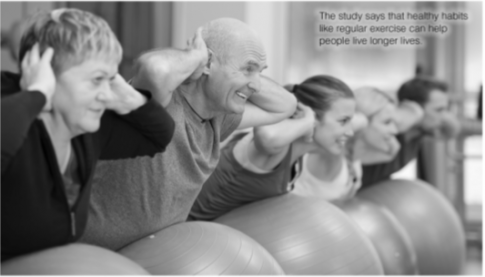Giải bài tập sách bài tập (SBT) tiếng anh lớp 10 Explore new worlds unit 10 Lifestyles Lesson D
Explore new worlds unit 10 Lifestyles Lesson D: Sách Giải bài tập tiếng anh lớp 10
Được phê duyệt trong chương trình đổi mới của Bộ Giáo dục và đào tạo, sách bài tập (SBT) tiếng anh lớp 10 Explore new worlds unit 10 Lifestyles Lesson D cung cấp cách hướng dẫn cụ thể và giải chi tiết cho học sinh. Với nội dung phong phú, sách giúp học sinh nắm bài học tốt hơn trong chương trình học mới hiện nay. Hy vọng rằng, việc phân tích chi tiết, dễ hiểu sẽ giúp học sinh khám phá và tham gia vào thế giới mới một cách hiệu quả.
Bài tập và hướng dẫn giải
Reading
Healthy Habits
Everyone wants to live a long and healthy life. Researchers studying longevity, or how long a person lives, look at people”s lifestyles, including their habits. They do this because they want to know which habits help people live longer.
In 1970, some scientists asked 7,000 people in the United States about their habits. Then, they checked to see how long the people Iived. The scientists learned that the people with the longest lives:
1. ate breakfast every day.
2. didnt eat snacks between meals.
3. weren't too heavy or too thin.
4. exercised regularly.
5. slept seven to eight hours every night—no more, no less.
6. didn’t smoke.
7. drank plenty of water every day.
These seven habits made a big difference. People who did all of these things lived 12 years longer than people who did only one, two, or three.

Habits are unlike other longevity factors—such as genes or environment—because people can change their habits. It’s not always easy, but it’s possible to learn good habits and break bad ones.
So, how can people successfully change their habits? Scientists say to make changes slowly. It’s important to have clear goals. A goal like “live a healthier lifestyle” sounds good, but isn’t clear. How will you do this exactly? A clearer goal is, for example, to take a walk every evening, or to stop eating snacks between meals. And to break a bad habit, some experts suggest replacing it. For example, if a person is trying to quit smoking, they should drink a glass of water or go for a short walk when they feel like they want a cigarette. Experts also say you should be patient. Changing habits takes time, and nobody does it perfectly the first time.
factor (n) one thing that influences a situation
genes (n) cells in your body with information passed down from your parents that decides how you will develop (for example, to have blue eyes or to be tall)
A. Read the article. What does it say about each habit? Circle good, bad or no information.
1. Eating eggs and fruit for breakfast every day good bad no information
2. Not getting enough sleep good bad no information
3. Going to the doctor often good bad no information
4. Going for a walk every night good bad no information
5. Being too thin good bad no information
6. Drinking plenty of water every day good bad no information
7. Exercising every day good bad no information
8. Smoking good bad no information
B. Circle the correct words toplete the sentences.
1. A study of longevity looks at how long / well a person lives.
2. The scientists in the article wanted information about people’s diets / habits.
3. Drinking coffee every day is / isn't one of the seven healthy habits.
4. Not getting enough sleep is a(n) healthy / unhealthy habit.
5. When you stop a bad habit, you break it / pick it up.
6. An example of a(n) clear / unclear goal is to eat at least five vegetables a day.
7. Experts say people could / should make changes slowly.
C. Read the advice about changing habits. Check (v) the sentences that agree with the article.
[ ] 1. People should make changes slowly.
[ ] 2. It's not necessary to have goals.
[ ] 3. People should replace a bad habit with something.
[ ] 4. It doesn't take much time to learn good habits.
[ ] 5. It’s important to have clear goals.
[ ] 6. People have to understand that it takes time to change their habits.
[ ] 7. Drinking a glass of water with every meal is a clear goal.
D. Answer the questions.
1. How many of the seven habits do you have? Which ones?
2. Which of the habits do you think is the easiest to keep? Why?
3. Which of the habits do you think is the hardest to keep? Why?





